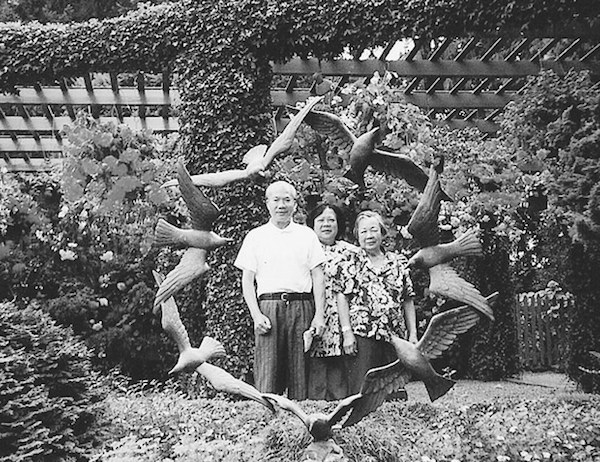
My dear fellow citizen: Today you are becoming a member of our great Canadian family, with its common values of freedom, respect, tolerance and sharing. By coming here, you have enriched our collective history with your own experience.
EPILOGUE
Canadian—At Last

VICTORIA, 2007
“I swear that I will be faithful . . .”
With my nephew, Ah Doon, translating for his parents, Ah Lai and Ah One repeated the phrases in Chinese. This was the final step in becoming Canadian citizens; their required five years of residency had passed in a flash, and they had submitted their applications only a few months earlier. Their English was still far from fluent, coming to Canada as they had in their sixties. Learning a new language was hard, so they were given some leeway with the translation. In addition, the officials had come to their home to perform the ceremony, all quite a sharp contrast to the drawn-out process experienced by our father when he had sought a country to belong to.
Judge Brown, a citizenship judge based in Vancouver, came to Ah Lai and Ah One’s apartment in Victoria on June 13, 2007, to conduct a private swearing-in, in deference to Ah One’s bedridden condition. He was blind, and his right side was partially paralyzed, the result of a long-ago stroke, so he raised his left hand during the ceremony. Michael and I took the pictures for posterity.
Donning her black robe, accented with pink, Judge Brown opened the formal ceremony with a talk about the significance of becoming citizens during the year 2007. “Canada is celebrating sixty years of Canadian citizenship. Before 1947, people were considered British citizens. The Canadian Citizenship Act recognized a separate Canadian identity from the rest of Great Britain.”
That year was also when the Chinese Immigration Act of 1923, known as the Chinese Exclusion Act, was finally repealed, lifting the ban on Chinese immigration. On June 22, 2006, Prime Minister Stephen Harper apologized, on behalf of Canada, for discriminating against the Chinese by imposing a head tax.
While neither of my parents lived to witness the apology, they would have approved of the government’s acknowledging this institutionalized prejudice and been satisfied that it was done formally, in the House of Commons, where the original offending legislation had been passed. Mother and Father had lived their lives in Canada with their heads held high, not allowing other people’s attitudes and behaviours to cow them. They were as proud of their Chinese heritage as they were of their Canadian identities, and they had patiently hoped that the Canadian government, with its reputation for upholding justice, would eventually right this particular wrong.
About a year after the prime minister’s announcement, I requested a copy of the apology statement to keep with my father’s head tax document. I had not known the date of my sister’s citizenship appointment when I made the call, but when the statement arrived on the very morning of the ceremony, it seemed fitting that she, as the one who had stayed in China because of the legislation, should be presented with it.
My sister and brother-in-law were among the one hundred and sixty thousand new citizens sworn in that year. Eighty-five percent of all immigrants to this country want to be Canadians. And why not? Canada now revels in its diversity.

Ah One, Ah Lai, and Ah Thloo enjoy a famous garden, 1990s.
MAY Q. WONG, VICTORIA
The judge kept her message brief, then started the recitation of the Oath of Allegiance, pausing after each phrase. My sister held a copy of the oath in her free hand and stood close to Ah One’s raised hospital bed. Ah Doon stood between his parents, translating. All three started with slight smiles on their faces. As they came to the end, their smiles and voices, especially my brother-in-law’s, became wider and stronger, emphasizing each phrase with anticipation of their new status. “. . . and bear true allegiance to Her Majesty Queen Elizabeth the Second, Queen of Canada, . . . and that I will faithfully observe the laws of Canada and fulfil my duties as a Canadian citizen.”
Then Ah One turned his beaming face toward our voices to pose for a photograph. Written messages from Governor General Michaëlle Jean and from the minister of citizenship and immigration were also presented.

Author with her father, 1981.
ROBERT WONG, VICTORIA
“Congratulations!” said Judge Brown, shaking their hands. “I welcome you as Canadian citizens!”
By taking on the mantle of Canadian citizenship, my sister not only shed her Chinese passport but also shrugged off the stigma of being the daughter left behind. She had accepted the apology by Canada’s highest office as well as the challenge of creating a new life in her parents’ chosen country.
Michael and I rushed forward to hug Ah Lai and her husband. Returning my welcoming embrace, my sister said, with a smile and a catch in her voice, “Ah Moy, Mommy and Daddy in heaven are very happy. Today, we have realized their lifelong dream. Finally, our whole family has been reunited as Canadians!”